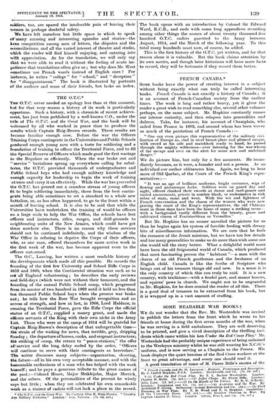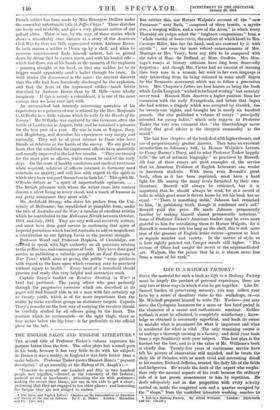SOME READABLE WAR BOOKS1-
WE do not wonder that the Rev. Mr. Westerdale was invited to publish the letters from the front which he wrote to his friends at home during the first seven months of the war, when he was serving in a field ambulance. They are well deserving to be printed, and give a vivid description of the thrilling inci- dents which came within his ken Under tits Red Cross Flag.' Mr. Westerdale had the probably unique experience of being ordained to the Wesleyan ministry whilst he was still wearing his N.C.O.'s uniform, and is now serving as a Chaplain to the Forces. His book displays the quiet heroism of the Red Cross workers at the front to great advantage, and every one should read it.
A good• translation of some of M. Pierre Mine's stories of the
• French Cancuia and the St. Lawrence : Historic, Picturesque and Descriptive. By J. Casten Hopkins, F.S.S. London : Duckworth and Co. 17s. 6d. net.) t (1) Under the Red Cross Flag. By T. L. Barlow Westerdaic. London: Charles H. Kelly. ilk. net,1-12i Joifre Chaps. By Pierre Mille. London: John Lane. Ile. net.]—(3) In the Hands 91 the Enema,. By B. O. O'Itcrke. London: Longman" and Co. (Is. net.]—(4) Australia and the War. BY Azehibald T. Strong. Melbourne : George Robertson and Co. lls.i--(5) Fa44. Economy its War Time. By T. H. Wood and F. O. Hopkins.. Cambridge : at the Cniversity Press. [6d. net.}—(6) Revoker Shooting tn War. By Captain Charles D. Tracy. London Sliton, Prat-), and Co. Ps. net.)
French soldier has been made by Miss B6rengere Drillien under the somewhat unfortunate title of Joff re Chaps.= These sketches are lively and readable, and give a very pleasant notion of our gallant allies. There is one, by the way, of these stories which shows a remarkably close likeness to a story of the American Civil War by that too little appreciated writer, Ambrose Bierce. In both stories a soldier is blown up by a shell, and when he recovers consciousness finds himself unhurt, but so pinned down by debris that he cannot move, and with his loaded rifle— which had flown out of his hands at the moment of the explosion —pointing straight at his head, so that any sudden jar to its trigger would apparently send a bullet through his brain. In both stories the denouement is the same: the rescuers discover that the rifle had been harmlessly discharged by the explosion, and that the fears of the imprisoned soldier—much better described by Ambrose Bierce than by M. Mille—were wholly imaginary. If this is merely a coincidence, it is one of the most curious that we have ever met with.
An unvarnished but intensely interesting narrative of his experiences as a prisoner of war is related by the Rev. Benjamin G. O'Rorke in a little volume which he calls In the Hands of the Enemy.3 Mr. O'Rorke was captured by the Germans after the battle of Landrecies in August, 1914, and he remained a prisoner for the best part of a year. He was in turn at Torgau, Burg, and Magdeburg, and describes his experiences very simply and naturally. They will be of great interest to those who have friends or relatives in the hands of the enemy. We are glad to learn that the conditions for imprisoned officers have materially and morally improved in the last few months. " They are treated for the most part as officers, which cannot be said of the early days. On the score of healthy conditions and medical treatment when required, relatives of officers interned in Germany need entertain no anxiety, and still less with regard to the spirit in which they have resigned themselves to their lot." This spirit Mr. O'Rorke defines as " a spirit of imperturbable optimism. . . . The British prisoners with whom the writer came into contact discern a silver lining in every cloud, and a touch of humour in any petty annoyance they meet with."
Mr. Archibald Strong, who dates his preface from the Uni- versity of Melbourne, has republished in pamphlet form, under the title of Australia and the War,' a number of excellent articles which he contributed to the Melbourne Herald between October, 1914, and July, 1915. They are very well and incisively written, and must have done good service in confirming that spirit of Imperial patriotism which has led Australia to add so magnificent a contribution to our fighting forces in the present struggle.
4'rofessor Wood and Professor Hopkins, of Cambridge, are en/Med to speak with high authority on all questions relating to the preduction and consumption of food. They have done good service in publishing a valuable pamphlet on Food Economy in War Time,a which aims at giving the public " some guidance with regard to the lines upon which economy may be practised without injury to health." Every head of a household should procure and study this very helpful and instructive work.
Captain Tracy's booklet on Revolver Shooting in War 6 is brief but pertinent. The young officer who goes patiently through the progressive exercises which are described in its pages will find himself able to hit a man with fair certainty up to twenty yards, which is of far more importance than the ability to make excellent groups on stationary targets. Captain Tracy's remarks on the best way of carrying the revolver should be carefully studied by all officers going to the front. The position which he recommends—on the right thigh, three or four inches below the hip-bone—is far preferable to the official place on the belt.



















































 Previous page
Previous page